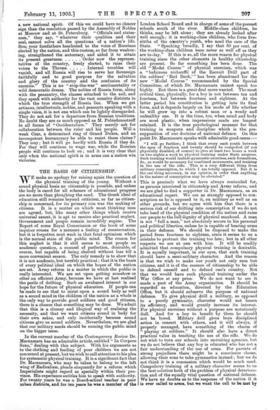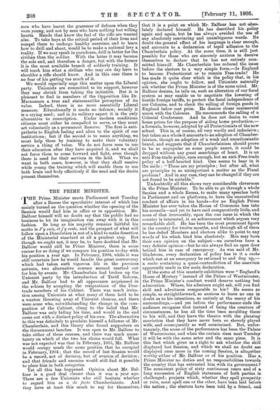W E make no apology for raising again the question of
the physical training of the young. Without a sound. physical basis no citizenship is possible, and unless the body is cared for all schemes of educational progress are no more than ploughing the sand. The Greek ideal of education still remains beyond. criticism, so far as citizen- ship is concerned, for its primary aim was the making of citizens. It is a matter on which most thinking men are agreed, but, like many other things which receive universal assent, it is apt to receive also practical neglect. Government and people remain incredibly supine. The Report of some Royal Commission or the book of some inquirer rouses for a moment a feeling of consternation, but it is forgotten next week in that fatal optimism which is.the normal state of the public mind. The reason for this neglect is that it still seems to most people an academic question, a counsel of perfection, desirable, of course, but capable of being shelved without loss till a more convenient season. The only remedy is to show that it is not academic, but terribly practical ; that it is the basis of every political ideal on which the hopes of the nation are set. Army reform is a matter in which the public is really interested. We are set upon getting somehow or other an efficient Army, because we have at last realised the perils of drifting. Such an awakened interest is our hope for the future of physical education. If people can be made to see that to insist upon a sound body as well as a sound mind in the children of the nation as a whole is the only way to provide good soldiers and good citizens, there is a chance that something may be done. We admit that this is a clumsy and illogical way of realising the necessity, and that we want citizens sound in body for their own sakes, and only incidentally because sound citizens give us sound soldiers. Nevertheless, we are glad that our military needs should be rousing the public mind. on the bigger issue.
In the current number of the Contemporary Review Dr. Macnamara has an admirable article, entitled " In Corpore Sane," dealing with this subject. With his arguments as to the clothing and feeding of poor children we are not concerned at present, but we wish to call attention to his plea for systematic physical training. It is a significant fact that Dr. Macnamara, who may be taken to belong to the left wing of Radicalism, pleads eloquently for a reform which Imperialists might regard as specially within their pro- vince. His experience entitles him to speak with authority. For twenty years he was a Board-school teacher in poor urban districts, and for ten years he was a member of the London School Board and in charge of some of the poorest schools south of the river. Middle-class children, he thinks, may be left alone ; they are already looked after well enough ; it is working-class children, who form five- sixths of the country's youth, who need the care of the State. " Speaking broadly, I say that 80 per cent. of the working-class children were never so well off as they are to-day." If this is so, all the more reason for physical training since the other elements in healthy citizenship are present. So far something has been done. The old "Model Course" of physical exercises, which was a " ludicrous rechauffe of the Recruit Drill part of the soldiers' Red Book,' " has been abandoned for the new " Model Course " recommended by the Special Committee, of which Dr. Macnamara cannot speak too highly. But there is a great deal more wanted. The most critical time, physically, for a boy is not between ten and fourteen, but between fourteen and eighteen. At the latter period his constitution is getting into its final form, and it depends largely on his mode of life whether he will grow up into a robust man or a weedy and unhealthy one. It is the time, too, when mind and body are most plastic, when impressions made are longest retained. It is the true psychological moment for that training in weapons and discipline which is the pre- supposition of our doctrine of national defence. On this point Dr. Macnamaxa, speaks with admirable good-sense:- "I will go further; I think that every such youth between the ages of fourteen and twenty should be compelled (if not physically disabled, of course) to give at least two hours a week on two nights a week to physical training under State auspices. Such training would include gymnastic exercises, such formations, &c., as would be necessary for combined movements, and training in the use of the rifle. This is a very different thing from military conscription, to which I am totally opposed. But it is the one thing necessary, in my opinion, in order that anything in the nature of conscription may be obviated."
This is precisely what we have always contended for, as persons interested in citizenship and Army reform, and we are glad to find a supporter in Dr. Macnamara, as an educational expert. We are as strongly opposed to con- scription as he is opposed to it, on military as well as on other grounds, but we agree with him that there is a serious risk of our drifting into conscription if we do not take heed of the physical condition of the nation and raise our people to the full dignity of physical manhood. A man is not "full a man," not absolutely secure in his personal and political liberties, unless he is capable of bearing arms in their defence. We should. be disposed to make the period from fourteen to eighteen, since it seems to us a mistake to protract the training too late; but in all other respects we are at one with him. It will be readily admitted. that compulsory physical training is desirable. It is equally important, in our eyes, that such training should have a semi-military character. And the reason is that we wish to make our youth not only men but citizens, and it is of the essence of citizenship to be able to defend. oneself and to defend one's country. Not that we would have such physical training under the War Office at any price. We do not want to see it made a part of the Army organisation. It should. be regarded as education, directed by the Education Office, but it should subserve the purpose of national defence. To give physical drill a military, as opposed to a purely gymnastic, character would not lessen its efficiency, and would greatly increase its interest. For physical exercises without a purpose are notoriously dull. And for a boy to benefit by them he should. not be bored. Military drill gives boys disciplined action in concert with others, and it will always, if properly managed, have something of the charm of " playing at soldiers." It should also have a direct practical value in teaching the use of the rifle. We do not wish to turn our schools into recruiting agencies, but we do not believe that any boy is educated who has not a fair understanding of the use of arms. For parents of strong prejudices there might be a conscience clause, allowing their sons to take gymnastics instead ; but we do not think it is a concession which would be much used. Compulsory training of a military character seems to us the best solution both of the problem of physical deteriora- tion and of the equally vital question of national defence. We have no doubts as to the response of the nation if it is ever called to arms, but we want the call to be met by men who have learnt, the grammar of defence when they were young, and not by men who have nothing but willing hearts. • Hands that know the feel of the rifle are wanted also. To take boys at the critical period of their lives and compel them to undergo healthy exercises, and to learn how to drill and shoot, would be to make a national levy a reality. If we may speak in paradoxes, drill is better for the civilian than the soldier. With the latter it may become the sole end, and therefore a danger, but with the former it is the most available branch of soldierly training. It will teach him what a civilian who may one day have to shoulder a rifle should know. And in this case there is no fear of his getting too much of it. We would especially urge this matter upon the Liberal party. Unionists are committed to its support, however they may shrink from taking the initiative. But it is pleasant to find in members of the Opposition like Dr. Macnamara a true and statesmanlike perception of its value. Indeed, there is no more essentially Liberal measure. Educationally it needs no defence; socially it is a crying need ; and in its military aspect it is the only alternative to conscription. Under modern conditions citizens must either be compelled to serve, or they must act voluntarily as a permanent Reserve. The first is anti- pathetic to English feeling and alien to the spirit of our institutions ; but if the second is to mean anything, we must help them by training to make their voluntary service a thing of value. We do not force men to use their education after they have acquired it, and we shall not force them to come forward and fight, even though there is need for their services in the field. What we want in both cases, however, is that they shall receive while young the training which will enable them to use both brain and body effectively if the need and the desire present themselves.







































 Previous page
Previous page